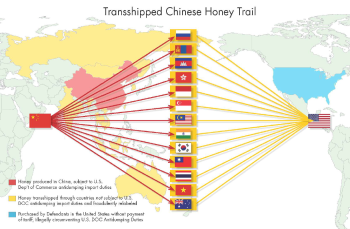Milwaukee’s Global Honey Scam
Milwaukee-owned honey farm, a U.S. leader in illegally importing fake Chinese honey, faces criminal and civil penalties.

Honey. Photo by Siona Karen
A government sting uncovering massive illegal shipments of Chinese honey has the nation’s 2,000 commercial beekeepers abuzz, and has a Milwaukee venture capital firm facing millions of dollars in potential criminal and civil penalties.
In February, 2013, the US Department of Justice criminally charged Groeb Farms, Inc., of Onsted, Michigan with the illegal purchase of 1,578 container loads of Chinese-origin honey from February 2008 to April 2012. Groeb, the largest honey packer in the nation, is owned by Horizon Partners, Ltd. of Milwaukee.
In a deferred prosecution agreement, Groeb admitted the illegal importation of the honey to avoid paying “no less than $78,866,216” in anti-dumping duties and paid a $2 million fine. Charges will be dropped in 2 years if the firm no longer violates the law.
Horizon Partners was not named in the criminal complaint against Groeb, but is a defendant in a federal civil class-action lawsuit filed in the U.S. District Court for the Northern District of Illinois in April by three honey producers on behalf of all members of their class.
The suit notes that all violations occurred after Horizon’s 2007 purchase of Groeb, which had been a family-owned firm since 1973. According to the suit: “Horizon exercised its control over Groeb in such a manner as to commit fraud by knowingly, intentionally, and/or recklessly directing Groeb to purchase, package, distribute, and sell falsely labeled honey in order to increase profits for Horizon and its investors.”
Groeb describes itself as “a global leader in honey processing and best-in-class producer of food ingredients, industrial sweeteners and food service products.”
Horizon Partners was founded in 1988 by Robert M. Feerick, of the prominent Milwaukee funeral home family. He is Horizon’s CEO and also serves on the board of Groeb, and did so at the time of the fraud, according to court records.
According to the Horizon’s website, “Horizon Partners, Ltd. is a private investment holding company which acquires and builds private companies. … Horizon gives management wide latitude in running the companies. Over time, Horizon provides management teams the opportunity to acquire significant direct ownership in its companies.”
But according to the suit, Groeb’s managers, perhaps eager to acquire their “significant direct ownership” were “under constant pressure by Horizon and its executives to provide more profits,” which they thought they found in a complicated transshippment ruse that led to the criminal charges and the civil complaint.
How to Launder Honey
US investigations dating to 1994, known colloquially as “Honeygate,” determined that China was dumping honey at less than market prices. While American honey costs about $1.20 – $1.40 a pound to produce, the Chinese can produce honey for as little as $0.22 a pound. This is due to a number of reasons, including prematurely harvested honey, which has a higher water content, and to other factors, like adulterating honey with cheap sweeteners. The Chinese also used US-banned chemicals to maintain hive health.
As a result of this unfair advantage, the United States government imposed an anti-dumping duty on Chinese honey of as high as 221 per cent to retain the competitiveness of the domestic product.
After the ban, official Chinese exports decreased, yet its honey production capacity increased, a red flag to prosecutors.
Where did the Chinese honey go?
In order to circumvent the duties imposed by the US, exporters shipped Chinese honey to second countries, which then shipped it to Groeb, accompanied by “fake and fraudulent bills of lading, invoice, packing list and country of origin certificates,” indicating the honey was from those countries.
These nations include Indonesia, Malaysia, India, Mongolia, Thailand and Vietnam, “all countries with virtually no commercial beekeeping operations,” according to the civil suit. [Emphasis original.]
The suit quotes Jill Clark, a sales executive for a honey company who told a magazine writer, “we saw a flurry of honey starting to come into the US from countries — Indonesia, Malaysia, Philippines — that had never been exporting to the US before. … All of a sudden they had millions of pounds of honey to sell, at very cheap prices.”
In India, for example, there were no honey exports in 2000, while the country was the supposed source of origin for 13,137 metric tons in 2009 — a remarkably short time for a 29-million pound honey industry to develop, and equal to the production of about 290,000 commercial hives.
Malaysia, which also had no U S honey exports in 2000, was credited with 9,068 metric tons in 2009.
U S customs duties thus evaded amounted in aggregate to some $200 million between 2009 – 2010. Of that, Groeb Farms purchases represented $78.9 million of the losses to the treasury.
Groeb and others further complicated the scheme by “falsely and fraudulently describing honey as a product other than honey, including sugar and syrups.” The adulterated honey “contained inexpensive sweeteners and was sometimes blended with high fructose corn syrup and other additives,” according to the civil complaint. (It perhaps says something about the quality of Chinese honey that this subterfuge was not readily detected by taste.)
Markers of Honey Origin Removed
Traditionally filtered natural honey will remove “bee parts, wax and debris, but will leave pollen in place,” according to the civil suit. The pollen in honey is a reliable indicator of its origin, which can be traced to the source plants and their growing environments.
According to the civil complaint, beginning in 2009, after its purchase by Horizon, “Groeb began conducting 100 percent lot testing on all of its raw honey through a state-of-the art testing laboratory and employed specialty testing personnel to perform testing at its Florida facility. While Groeb easily could have tested for the presence of various pollens, it chose not to do so. Horizon knew this.”
Groeb also claimed to be on the cutting edge of “traceability” of honey origins and claimed to conduct audits of its suppliers. “Those audits would have revealed to Horizon and the Board of Directors that Groeb was purchasing honey from China,” the complaint alleges. “As Groeb expanded and profits rose, Horizon either knew or deliberately chose not to inquire further to determine that Groeb was breaking the law and fraudulently importing, packing, and re-selling illegal Chinese honey.”
As a result, the complaint says, “Horizon profited from, endorsed, and supported the illegal and fraudulent transshipping scheme. As a result of this conduct, the corporate veil must be disregarded and Horizon held liable to Plaintiffs for the damages outlined below.”
The complaint asks for relief on the grounds of False Advertising, Unfair Competition and Racketeer Influenced Corrupt Organization as violations of the Lanham Act and the RICO Act.
About Horizon
Horizon Partners, Ltd. is a Wisconsin corporation organized in 1988 by Robert M. Feerick with an address of 825 N. Jefferson St., Suite 300. Its principal office is located in Naples, Florida, where Feerick spends much of his time in a $1.7 million home, which he owns in addition to a Mequon condo.
According to the firm’s website, “Horizon Partners, Ltd. is a private investment holding company which acquires and builds private companies. Horizon focuses on the acquisition of medium size companies that are privately held or divisions/subsidiaries of larger corporations. In general, the companies have a history of sales and earnings growth. On occasion, Horizon will consider turnaround situations. The purchase prices for such acquisitions are in the $3-50 million range.
Horizon’s investment strategy is to build long-term equity value in its portfolio companies through strategic add-on acquisitions and improvements in operating performance.”
In addition to Groeb, Horizon currently owns Climax Portable Machining and Welding Systems of Portland, Oregon, which provides portable machining services (acquired in 2005) and Xymox Technologies of Milwaukee, a manufacturer of membrane switches which it bought from Brady Corp. in 1993.
The company provides a complete acquisition history on its website.
About Robert M. Feerick
Feerick is a member of a prominent family of Milwaukee funeral directors; however, he does not practice the family trade. Here is his biography from the Horizon website:
Mr. Robert M. Feerick is the Principal and Chairman at Horizon Partners, Ltd. Mr. Feerick is also the Founder of the firm. Mr. Feerick has a broad background in private equity capital investments and acquisitions. Prior to this, he was the Chairman of The Corporate Development Group. In this capacity, Mr. Feerick assisted numerous corporations and management groups in evaluating, structuring, and financing acquisitions and venture capital transactions. Previously, he was a General Partner at Frontenac Company. Mr. Feerick serves as Director of Climax Portable Machine Tools, Inc., Groeb Farms, Inc., Karl’s Event Services, Inc, Xymox Technologies, Inc., and Lantor International, Inc. He served as a Director of First National Bank of the Gulf Coast from October 2009 to June 2012. He was a Director of the Orval Kent Food Company, Inc., Universal Blanchers, LLC, Image Conversion Systems, Inc., and WinterQuest, LLC. Mr. Feerick received an M.B.A. from the University of Chicago and graduated Phi Beta Kappa from Georgetown University.
Plenty of Horne
-
Milwaukee Modernism Gains National Awards
 Dec 15th, 2025 by Michael Horne
Dec 15th, 2025 by Michael Horne
-
New Rainbow Crosswalks Mark Milwaukee’s LGBTQ+ History
 Oct 8th, 2025 by Michael Horne
Oct 8th, 2025 by Michael Horne
-
Welcome Back, Tripoli Country Club!
 May 27th, 2025 by Michael Horne
May 27th, 2025 by Michael Horne






















Thank you Michael for reporting on this. I go through about 5 pounds of honey per month and purchase from a local bee keeper and honey producer. Reporting like yours warns the consumer about the ongoing fraud in the food market place. The operations of this business have been cheating many of the smaller businesses that work to bring honest legitimate food resources to the consumers’ table.
Did I read that right? They scammed to avoid $78 million in duty payments and got fined only
$2 million?
Only in America.
5 pounds of honey per month??? I bet my lifetime total is less than that. Cool article.
Great in coffee, tea, oat meal, french toast, as a replacement for regular sugar. May be a healthier product unless it is coming from China.
Classic. Glad these goons got caught…
Ed – yes a $2 million fine that seemed worth the risk. Plus if they do not violate the law within two years, the fine is rescinded. No way to tell what China was lacing the food product with. I would not buy any food product, for human or animal, from China. Sometimes you have no way of knowing – like certain fish from restaurants raised in sludge ponds with toxic waste products.
Great article. All this is information is truly amazing. Can somene add more information on China’s practices to use banned chemicals on their bees?
David Ciepluch – who do you buy your honey from? I’d love to get a good source of local honey for my business…
Very reasonable pricing. She also sells at the farmers market in Ziedler Park on Wednesday and a few other markets. http://www.honeylocator.com/locator/profiles/display/violas-honey/
Great story, wow. You fact gathering skills just get better all the time. You sir are very sharp and Milwaukee’s lucky to have you.